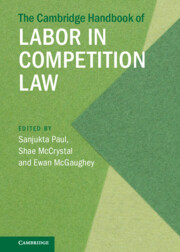Book contents
- The Cambridge Handbook of Labor in Competition Law
- The Cambridge Handbook of Labor in Competition Law
- Copyright page
- Contents
- Contributors
- Preface
- 1 Labor in Competition Law
- 2 Collective Labour Rights for Working People
- 3 Economic Coordination as Freedom of Association
- 4 The State’s Power to Govern in This Field Is Paramount: Antitrust, Labor, and the First Amendment
- 5 Competition Law as Collective Bargaining Law
- 6 Antitrust, Free Trade, and Fissuring
- 7 American Antitrust Exceptionalism
- 8 Competition and Labour Law in Canada
- 9 Workers and Competition Law in Japan
- 10 Workers and Competition Law in Australia
- 11 Workers and Competition Law in New Zealand
- 12 Competition Law and Labour Law
- 13 Workers and Competition Law in India
- 14 Competition and Labour Law in the United Kingdom
- 15 A Solution in Search of a Problem?
- 16 Competition and Labour Law in Germany
- 17 Labour Law and Competition Law Under French Regulation
- 18 Competition Law, Cartels and Collective Bargaining
- 19 The EU, Competition Law and Workers Rights
- 20 Is South American Collective Labor Law Confronted by Competition Law?
- 21 Conclusion
6 - Antitrust, Free Trade, and Fissuring
Published online by Cambridge University Press: 05 May 2022
- The Cambridge Handbook of Labor in Competition Law
- The Cambridge Handbook of Labor in Competition Law
- Copyright page
- Contents
- Contributors
- Preface
- 1 Labor in Competition Law
- 2 Collective Labour Rights for Working People
- 3 Economic Coordination as Freedom of Association
- 4 The State’s Power to Govern in This Field Is Paramount: Antitrust, Labor, and the First Amendment
- 5 Competition Law as Collective Bargaining Law
- 6 Antitrust, Free Trade, and Fissuring
- 7 American Antitrust Exceptionalism
- 8 Competition and Labour Law in Canada
- 9 Workers and Competition Law in Japan
- 10 Workers and Competition Law in Australia
- 11 Workers and Competition Law in New Zealand
- 12 Competition Law and Labour Law
- 13 Workers and Competition Law in India
- 14 Competition and Labour Law in the United Kingdom
- 15 A Solution in Search of a Problem?
- 16 Competition and Labour Law in Germany
- 17 Labour Law and Competition Law Under French Regulation
- 18 Competition Law, Cartels and Collective Bargaining
- 19 The EU, Competition Law and Workers Rights
- 20 Is South American Collective Labor Law Confronted by Competition Law?
- 21 Conclusion
Summary
Just as the relationship between labor and antitrust is often misunderstood, this chapter argues that the relationship between antitrust and trade policy is frequently misunderstood or misrepresented, and it has important implications for labor. Above all, they are seen as operating in distinct spheres, with antitrust as a domestic policy and trade as an international one. In light of this, I first outline several common conceptual frameworks used to understand the relationship between the two policy areas, drawing on work from economics, political science, and law. Second, I contrast different views on the changes to industrial organization, globalization, and trade that have made this distinction obsolete. I argue that the problems at the intersection of domestic antitrust and labor regulation – workplace fissuring, subcontracting, franchising etc. – are in fact that same set of problems associated with power imbalances in international supply chains emphasized by scholars of globalization. I finish with a case of 20th-century trade and antitrust policy showing that many of the domestic regulatory changes to antitrust and labor were motivated by a desire to protect American industry from international trade competition. While different perspectives either frame globalization as an external driver of domestic re-regulation or as irrelevant to it, globalization as currently experienced is in part constituted by these domestic reforms.
- Type
- Chapter
- Information
- The Cambridge Handbook of Labor in Competition Law , pp. 96 - 112Publisher: Cambridge University PressPrint publication year: 2022

